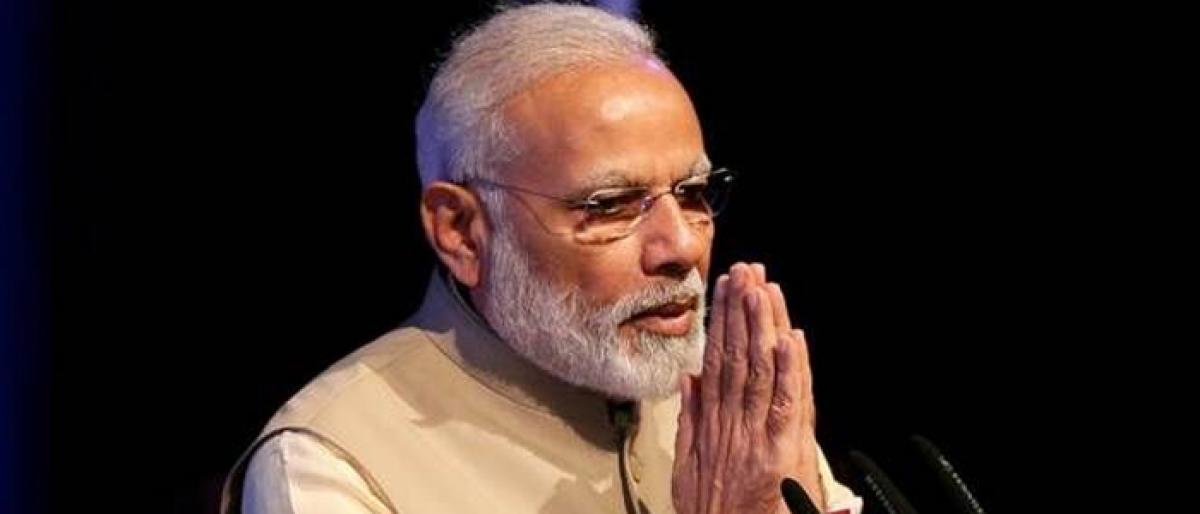Live
- Former SC judge V. Ramasubramanian appointed as NHRC Chairperson
- Shyam Benegal: A true inspiration for aspiring film-makers
- Heavy snow forecast in Japan through Tuesday
- Legendary film-maker Shyam Benegal is no more
- Hackers steal over $12.7 billion in over 1,000 crypto heists to date
- BGT: 'Rohit is short of confidence with self-doubts', opines Manjrekar
- Gold gains 30 pc in 2024, silver 35 pc up on COMEX this year: MOFSL
- Delhi HC dismisses anticipatory bail plea of ex-IAS trainee officer Puja Khedkar
- Untouched Goa Beaches You Must Visit in January
- Muzigal launches its State-of-the-art Music Academy in Nallagandla, Hyderabad
Just In

The Union Cabinet Committee on Economic Affairs on Wednesday approved Minimum Support Price (MSP) for summer-sown crops for the year 2018-19, which will provide farmers a profit of 50 per cent or more over the cost of production. The additional bill is likely to be around Rs 33,500 crore.
New Delhi: The Union Cabinet Committee on Economic Affairs on Wednesday approved Minimum Support Price (MSP) for summer-sown crops for the year 2018-19, which will provide farmers a profit of 50 per cent or more over the cost of production. The additional bill is likely to be around Rs 33,500 crore.
Addressing the media, Union Minister Rajnath Singh said the Cabinet had taken the "historic" decision to provide relief to distressed farmers as it would have "positive impact" on the economy.
The new MSP largely applies to paddy and pulses but benefits ‘nutri-cereals’ like millets the most. The added cost of MSP is 0.2% of GDP, according to the cabinet note. The share of paddy in the additional outgo will be around Rs 15,000 crore.
Rajnath Singh said the Commission of Agricultural Costs and Production (CACP) had fixed input cost for major monsoon crop paddy at Rs 1,166 per quintal and the government had added 50 per cent profit, which would make the MSP Rs 1,750 per quintal this year -- a steep increase of Rs 200 from Rs 1,550 last year.
The MSP for 'Grade A' variety of paddy would be Rs 1,770 per quintal while it will be Rs 2,430 per quintal for jowar -- a year-on-year jump of Rs 730.
The minister said the MSP would be based on 'A2 +FL' - one of the input cost concepts recommended by the Swaminathan Commission and the Central government would spend additional Rs 15,000 crore on account of the higher MSP. Rajnath Singh said the MSP for bajra would be Rs 1,950 per quintal -- return of about 97 per cent as the input cost calculated by the CACP was Rs 990 per quintal. The government has fixed the MSP of Rs 5,675 per quintal for arhar (66 per cent profit), Rs 6,975 for moong and Rs 5,600 for urad.
In case of cotton, the MSP has been raised to Rs 5,150 per quintal. The MSP would be Rs 4,890 for groundnut, Rs 5,388 for sunflower, Rs 3,399 for soybean, Rs 6,249 for sesame and Rs 5,877 for nigerseed.
Rajnath Singh said the higher MSP was a part of the NDA government's plan to double farmers' income by 2022.
The Home Minister said: "I am a farmer, the Minister of Agriculture is a farmer, the Minister of Food Processing is a farmer and even the Minister of IT, Electronics, law and justice knows farming. Most of the Cabinet ministers are aware of the ground realities of farmers and that is why the cabinet has kept even the most underestimated aspect of farming under their scanner."
Rajnath informed that the cabinet has included the cost of family labour involved in farming and it has taken care of the rate of leased land involved in farming. Replying to a question, he said, "Government has not adopted cost C2+FL but it has opted for A2+FL which imputes family labour, hired machinery and leased land."
This may create another row of controversy as the Opposition has blamed the government of avoiding C2+FL formula. Experts on the condition of anonymity, though term it as a calculated masterstroke by the government which is about to face general election next year.

© 2024 Hyderabad Media House Limited/The Hans India. All rights reserved. Powered by hocalwire.com







